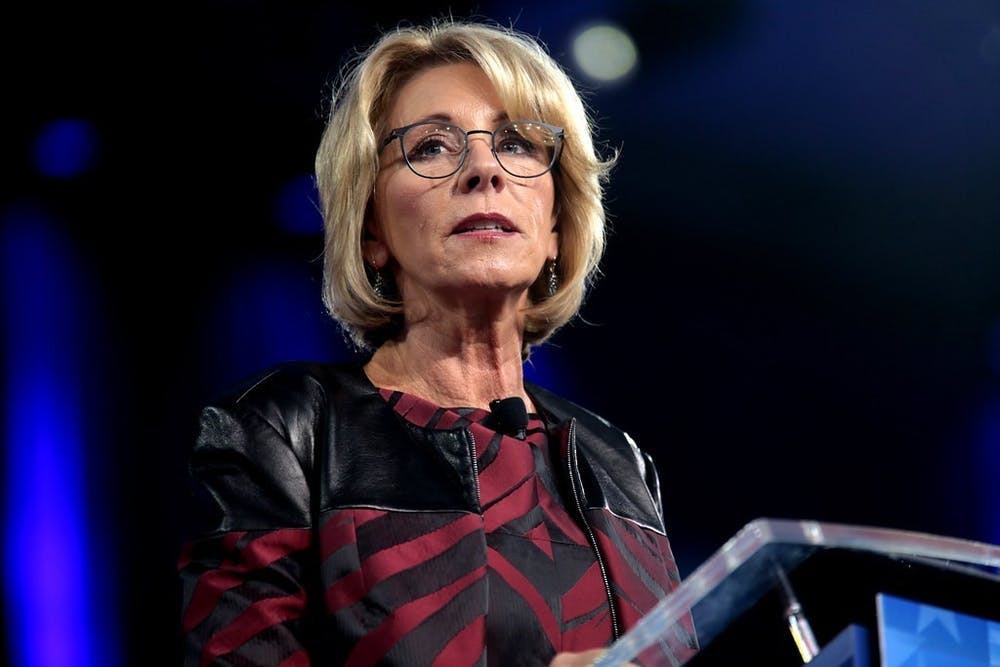Title IX is a civil rights law that prohibits sex-based discrimination in universities that receive federal funds. The Department of Education (DOE) issued changes to Title IX regulations three months ago, giving more rights to accused students in sexual harassment and assault cases.
The revised law, called “the Final Rule,” took effect and was implemented into the University’s Sexual Misconduct Policy and Procedures on August 14. In an email to the student body that day, Provost Sunil Kumar, Vice Provost for Institutional Equity Shannon Shumpert and Title IX Coordinator Joy Gaslevic detailed the impact of these changes, which have been condemned by advocates for survivors of sexual violence.
“Be assured that the foundation of our approach to addressing sexual misconduct remains unchanged. We maintain our full commitment to preventing sexual misconduct in all its forms, addressing reports in a timely and fair manner, and providing support for those involved in sexual misconduct matters,” they wrote.
In accordance with the Final Rule, live hearing by a trained panel and cross-examinations by hearing advisers will be added to the formal process to address Title IX Sexual Harassment, a subset of sexual misconduct.
However, even if reported forms of sexual misconduct do not fulfill the definition of Title IX Sexual Harassment, the University stated that it will still investigate the matter using its standard procedures prior to the Title IX amendments. Cases reported before August 14 will be investigated pursuant to the previous Title IX procedures.
In order to address any questions or concerns that students may have, the Office of Institutional Equity (OIE) will be scheduling virtual town halls for the public and briefings for academic councils once the semester begins. OIE is responsible for preventing all forms of discrimination across the nine divisions of the University.
Sexual Assault Resource Unit (SARU) Co-Directors Padmini Balaji and Michael Vidal, who are rising seniors, criticized the Final Rule in an interview with The News-Letter. However, they commended the University for maintaining the preponderance of evidence standard.
“The Department of Education changes... give institutions the option to ignore a lot of cases, including the ones that don’t meet their definition of sexual harassment or ones that occurred off-campus,” Balaji said. “I’m glad that the University is committing to investigate those cases that were covered previously by Title IX but aren’t anymore.”
According to Balaji and Vidal, OIE has been proactive in maintaining a consistent relationship with SARU, a student group that aims to dismantle rape culture and support survivors of sexual violence. When Title IX changes were released in May, they said, OIE reached out to SARU immediately to address SARU’s concerns and inform the group about its future plans.
In addition, Balaji is glad that OIE will give the option to conduct live hearings virtually.
“Even when we’re not in the pandemic, no survivor will be required to be in the same room as their perpetrator during a hearing,” she said.
To adapt to the completely virtual semester, Balaji and Vidal plan to host a virtual speaker series and other events to continue creating safe spaces for students.
“Usually SARU brings in someone from OIE during the semester to do a Q&A, which is general under standard policies and procedures,” Balaji said. “That meeting will be even more important this year because the policies and procedures have changed.”
Vidal hopes that OIE will be able to communicate these changes clearly and succinctly, especially since the original DOE document is 2000 pages long.
“My only hope is that the school will streamline the information and make it more accessible to students,” he said. “An issue that a lot of students have with OIE’s policies is that they are kind of confusing and difficult to navigate.”
Rising sophomore Robab Vaziri noted her appreciation for OIE’s commitment. She is a member of the Sexual Violence Advisory Committee (SVAC), through which the University receives input from students and faculty to revise its Sexual Misconduct Policy and Procedures.
“I believe that OIE is doing their best to support survivors and victims as much they can, given that they’re still investigating cases they’re not legally required to investigate,” she said. “It seems like they are receptive to suggestions by SVAC and by people who comment on OIE matters.”
Vaziri commended OIE for remaining active on social media to educate students, but questioned OIE’s overall transparency. She expressed hopes that OIE will provide more avenues in the future for students to voice their concerns.
Vaziri noted that of the 30 members of SVAC, there are only three to six students.
“There’s really no transparency that OIE provides about how they handle sexual misconduct,” she said. “The student body doesn’t have the information to answer whether OIE might discriminate — whether Black students have a disproportionately negative experience with OIE than white students.”
Similarly, Vidal shared that he would be interested to see data on whether OIE procedures disproportionately favor certain groups of students.
SVAC member Andrew Eneim, a second-year PhD student at the School of Medicine, shared concerns about OIE’s handling of cases in an email to The News-Letter.
“I appreciate that OIE often has a difficult job in seeing Title IX processes through, that does not excuse extended timelines for resolving cases which impacts students involved by dragging out the process and making an already stressful school life more difficult,” he wrote. “The University needs to invest more heavily in support systems for survivors of sexual violence.”
Robab Vaziri is a contributing writer for The News-Letter. She was not involved in the reporting, writing or editing of this article.
For crisis support and resource connections, call SARU’s confidential 24/7 peer-run hotline at (410) 516-7887.

















